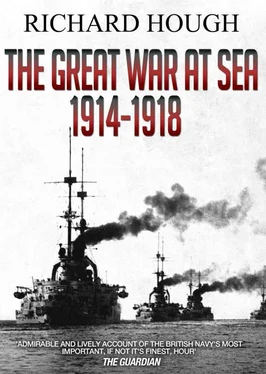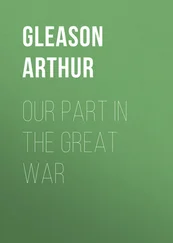The Germans emulated Britain’s long-established corrective for trouble abroad by sending a gunboat to Agadir. Britain’s own response was for a time confused, although everyone agreed that the situation could become dangerous. The Press response was varied, from the Manchester Guardian preaching peace and deploring panic, to the Standard on the far right: ‘The plain truth of the matter,’ ran an editorial, ‘is that no Government… could consent to allow a great foreign navy to station itself on the flank of our Atlantic trade and on the line of our route to the Cape.’ (3)Sir Arthur Nicolson, Permanent Under-Secretary at the Foreign Office agreed. The Admiralty, however, made light of the affair to the Foreign Office claiming that the Germans would require a powerful detachment to support this distant base, which would mean weakening the Fleet in the North Sea. Informed opinion also believed that Germany was much more interested in interfering with France’s suspected annexation of Morocco, humiliating her and driving a wedge into the newly formed Entente Cordiale .
It was an indication of the gravity of the crisis that, with bellicose words thick in the air in Germany, France, and Britain, Lloyd George. arch-pacifist radical-Liberal, made a speech at the Mansion House. Peace with Germany at the price of loss of vital interests ‘won by centuries of heroism and achievement’, was unacceptable he stated in his best patriotic manner. ‘National honour is no party question.’
During August and the early part of September 1911, while France and Germany tried to patch up their differences, war between Britain and Germany appeared for a time imminent. Grey sent for McKenna to warn him that the Fleet might be attacked at any moment.
The crisis and likelihood of war slowly receded, but it was noted by Asquith that the Fleet, though ready, had no war plans. Further enquiry revealed the absence of any progress on the formation of a Naval War Staff. Admiral Wilson was even more intractable over this question than Fisher. Both men believed that any plans should be locked up securely in the mind of the First Sea Lord, although it was rumoured (no doubt apocryphally) that Wilson had once scribbled his plans on one side of a piece of paper which was somewhere in his desk. When questioned at a meeting of the Committee of Imperial Defence at the height of the Agadir Crisis about the Admiralty’s strategy, Wilson could only mutter – he was no orator – that, briefly, the plans were for a close blockade of German ports, the capture of advanced bases, and possible landings on the enemy’s coast. He was against the Army sending an expeditionary force to help France until the enemy’s Fleet had been destroyed.
Churchill found that Fisher’s successor was quite out of his depth in terms of modern strategy, weapons, and conditions, with no intention of consulting with anyone, certainly not the Army, or even his civil master, the First Lord. Churchill’s admiration for Wilson as a man was boundless: ‘He was, without any exception, the most selfless man I have ever met or even read of. He wanted nothing and he feared nothing – absolutely nothing. [He had earned the VC fighting the Dervishes]… He impressed me from the first as a man of the highest quality and stature, but, as I thought, dwelling too much in the past of naval science, not sufficiently receptive of new ideas when conditions were changing so rapidly, and, of course, tenacious and unyielding in the last degree.’ (4)
Churchill selected as Wilson’s successor the C.-in-C. of the Home Fleet, an unexceptional man, Sir Francis Bridgeman, who seemed intelligent and alert and malleable, whom Churchill understood looked forward rather than back and was in favour of a Staff. Bridgeman’s first duty was to hand to Wilson Churchill’s letter demanding his resignation and offering him a peerage if he wanted one. When Wilson had hauled down his flag for the last time, in contrast with Beresford he had expressly forbidden even the smallest demonstration. Now he accepted the demand for his resignation in silence, and ‘without any grace whatever,’ according to Bridgeman, ‘promptly declined the honour’. (5)
This incident was only an early clue to the nature of the new regime. Suspicion of Churchill before he came to the Admiralty was widespread. Established Conservatives of all classes saw him as the man who had fought against increasing the strength of the Navy and now was its civil head with the responsibility for keeping it strong. ‘A self-advertising mountebank’, was the National Review’s opinion. Even the service and semi-service magazines were muted in their enthusiasm. The Navy League Annual stated that his arrival was not regarded with much favour. Nor could The Navy ‘feel much satisfaction at the change which has taken place’.
Traditionally, the First Lord of the Admiralty is not expected to know, or wish to know, much of the detail of the Navy of which he is political chief: The First Lord, who was responsible for the Navy to Parliament, presided at Board meetings and acted as spokesman for the Cabinet among his functions. Churchill was not content with these limited activities. To the concern of his Board and senior officers with whom he was immediately in touch, he revealed himself as a civilian Fisher, investigating, questioning, reforming where reforms were not thought to be needed, formulating plans – and not just Naval War Plans – where plans already existed or were not seemingly essential.
Churchill did not sit at his desk in Whitehall like McKenna or Lords Tweedmouth and Selborne before him. He dashed out to inspect dockyards and new ships, barracks and torpedo training establishments. He even went to sea. His position entitled him to the use of the Admiralty Yacht Enchantress , a 3,500-ton steam vessel, as graceful and comfortable as the Royal Yachts. During his first eighteen months in office Churchill spent a total of six of them at sea in the Enchantress , sailing with his senior admirals fellow politicians, and friends on board. He took Asquith to sea to observe gunnery practice, and, according to the Prime Minister, was soon ‘dancing about behind the guns, elevating, depressing and sighting’. (6)
None of this rushing about helped to improve the traditional naval establishment’s opinion of Churchill. Almost everywhere he went he left behind him hostility and suspicion for his methods and manner. He even succeeded in raising the wrath of his sovereign who already distrusted him. George V, the new King, was not only an Admiral of the Fleet of great experience: he loved his Navy and its traditions and high reputation. In Churchill he saw only the clever, opportunistic politician, and had agreed to his appointment with many reservations.
A month after Churchill became First Lord names had to be submitted to the King for new battleships under construction. This duty was the prerogative of the civil head of the Navy and Churchill took much satisfaction in it. The names he sent to Buckingham Palace were Africa , Oliver Cromwell , Liberty and Assiduous . These were scarcely traditional or ringing names and the King rejected them all except Africa . With extraordinary lack of tact and discretion, Churchill put forward Oliver Cromwell a second time and had it turned down again.
In reply Churchill sent the King’s secretary a long and strongly argued case for using the name of this militaristic, anti-monarchist and anti-Irish figure, adding that he was ‘satisfied that the name would be extremely well received’. He received a sharply-worded reply from Lord Stamfordham reminding him of the animosity aroused recently by the proposal that a mere statue to Cromwell should be erected, with the government of the day being overwhelmingly defeated in a vote on the issue. Why not Valiant ? was the King’s counter-suggestion. Churchill yielded, and in fact the super-dreadnought lived up to its name through two reigns and two world wars.
Читать дальше












